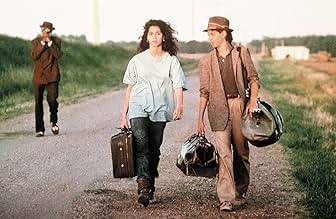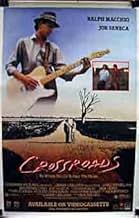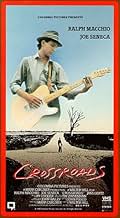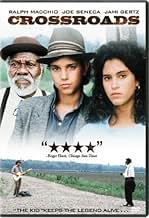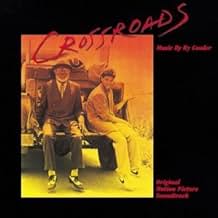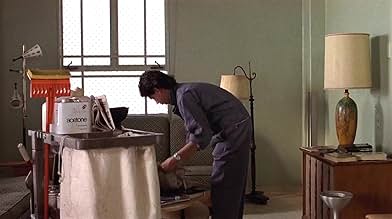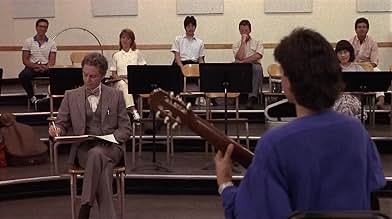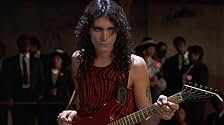A wannabe blues-guitar virtuoso finds an old blues player and hopes he can teach him a long-lost song by legendary musician, Robert Johnson.A wannabe blues-guitar virtuoso finds an old blues player and hopes he can teach him a long-lost song by legendary musician, Robert Johnson.A wannabe blues-guitar virtuoso finds an old blues player and hopes he can teach him a long-lost song by legendary musician, Robert Johnson.
- Awards
- 1 win total
Tom Donaldson
- John McGraw
- (as Tex Donaldson)
- Director
- Writer
- All cast & crew
- Production, box office & more at IMDbPro
Featured reviews
This movie starts slow and begins moving quickly as we see an outstanding modern version of faust (more like the Devil went down to Georgia). The end is a spectacular show down between Ralph Machio on a classic guitar vs. A rock & roll demon.
I have watched this movie no less than 20 times which is rare for me as I generally don't watch a movie more than 2 or 3 times and that's if I really, really, like it. Everyone in this movie did a fantastic job in my humble opinion.
I feel something for Ralph Macchio, and it is not love. The first time I ever saw his face, I can swear it inspired greatness. Then he talked, he act, he spread his talents all around, and no person can deny he was a natural. The character he created and developed in the first three "Karate Kids" (the first one is one of my favorite films) was sing of commitment and skill.
I was experiencing the hilarious "My cousin Vinny" the other day and he played another original character, being that one of his last important roles. Maybe what I feel is compassion because he couldn't make it as an elder man, and I really wanted to watch him grow. Maybe I miss his first and few big breaks, where he literally knocked me down; one of those being "Crossroads".
He was 25 at that time, but still had that 17-year old look, where you would have said: "Wow, he's 17 and in main role" Well, I'd have said that. "Crossroads" is an inspiring tale about life and music; blues. It was not the first time that a filmmaker tried to relate music with life. I have personally never had doubts about it, because music is life for me; but in this film, for writer John Fusco it was about growing up, understanding the gift and use it for good.
Macchio portrayed Eugene Martone, a naive guy, gifted guitar player, crazy driven by the magic of blues. The love for music makes our mind think unconsciously about getting far, being big; and Eugene wants to go to Mississippi to get his chance, but needs someone who knows Robert Johnson's lost melody, knows the way, and has even lived it, if you know what I mean. In this story, that character is blues master Willie Brown (a tremendous Joe Seneca), now forgotten in an asylum, probably crazy (although he says he isn't but some brilliant sequences show him out of place) and without his car. But Eugene will get him out of there and they'll both start that journey together.
What happens next, including the various stops, problems, Ralph Macchio's wonderful guitar playing abilities and encounter with beautiful girl Frances (radiant and talented Jami Gertz) is for the viewer to discover. Now, how the title relates it's touching and interesting, but where director Walter Hill triumphs (and this is something that should never be forgotten for music movies nowadays) is in knowing that the story is there. The heart of his film lies in the development of the kid's and the old man's relationship.
When we now see movies about music that sometimes don't even have a clue "musically" and most of the times there is music to promote an artist in the film, because he/she sings; in Hill's "Crossroads" and in the relationship I was talking about, the discussions, conversations, walks and even music playing, hide some of life's deepest interrogations. And I regret saying blues is always the same, because even when it is, it is one of those musical styles, like jazz, that not many listen but when they do discover their power. It's in the eyes of the musicians when they play where you can see it; they love being in that scenario, and that's just magical.
I was experiencing the hilarious "My cousin Vinny" the other day and he played another original character, being that one of his last important roles. Maybe what I feel is compassion because he couldn't make it as an elder man, and I really wanted to watch him grow. Maybe I miss his first and few big breaks, where he literally knocked me down; one of those being "Crossroads".
He was 25 at that time, but still had that 17-year old look, where you would have said: "Wow, he's 17 and in main role" Well, I'd have said that. "Crossroads" is an inspiring tale about life and music; blues. It was not the first time that a filmmaker tried to relate music with life. I have personally never had doubts about it, because music is life for me; but in this film, for writer John Fusco it was about growing up, understanding the gift and use it for good.
Macchio portrayed Eugene Martone, a naive guy, gifted guitar player, crazy driven by the magic of blues. The love for music makes our mind think unconsciously about getting far, being big; and Eugene wants to go to Mississippi to get his chance, but needs someone who knows Robert Johnson's lost melody, knows the way, and has even lived it, if you know what I mean. In this story, that character is blues master Willie Brown (a tremendous Joe Seneca), now forgotten in an asylum, probably crazy (although he says he isn't but some brilliant sequences show him out of place) and without his car. But Eugene will get him out of there and they'll both start that journey together.
What happens next, including the various stops, problems, Ralph Macchio's wonderful guitar playing abilities and encounter with beautiful girl Frances (radiant and talented Jami Gertz) is for the viewer to discover. Now, how the title relates it's touching and interesting, but where director Walter Hill triumphs (and this is something that should never be forgotten for music movies nowadays) is in knowing that the story is there. The heart of his film lies in the development of the kid's and the old man's relationship.
When we now see movies about music that sometimes don't even have a clue "musically" and most of the times there is music to promote an artist in the film, because he/she sings; in Hill's "Crossroads" and in the relationship I was talking about, the discussions, conversations, walks and even music playing, hide some of life's deepest interrogations. And I regret saying blues is always the same, because even when it is, it is one of those musical styles, like jazz, that not many listen but when they do discover their power. It's in the eyes of the musicians when they play where you can see it; they love being in that scenario, and that's just magical.
Here in Australia at the moment we have a series on the Blues and last week they were talking about going down to the Crossroads and making a pact with the devil. All of a sudden I needed to find my old video tape of the movie 'Crossroads', taped from television when I first saw it in 1986. The movie is one of my all time favourites and I can watch it time and time again.
Ralph Macchio plays the role of a young teenager, finding the blues and wanting to be a blues player instead of classical guitarist that he is training for. Joe Seneca plays the role of Willie Brown and he lives that role as though he really is Willie Brown. The music played in the scene at the end where Eugene gets Scratch to tear up the contract for Willie's soul is magic and brings tears to my eyes every time I see it. Maybe there is a place for both blues and classical.
Ralph Macchio plays the role of a young teenager, finding the blues and wanting to be a blues player instead of classical guitarist that he is training for. Joe Seneca plays the role of Willie Brown and he lives that role as though he really is Willie Brown. The music played in the scene at the end where Eugene gets Scratch to tear up the contract for Willie's soul is magic and brings tears to my eyes every time I see it. Maybe there is a place for both blues and classical.
10alecwest
I've seen CROSSROADS so many times I've lost count. And, it won't be the last time I'll watch it. The music alone would be reason enough. But, this film is far deeper. And no amount of exposition about it could ever *SPOIL* it for the virgin-viewer who has never seen it.
Eugene Martone, considered a prodigy on the classical guitar, is a young Long Island man attending the prestigious Julliard Music School. Problem? He prefers the blues over classical. And he's on a quest. He uncovers evidence that blues guitar legend, Robert Johnson, composed 30 songs. Since only 29 were ever recorded, he becomes obsessed at finding the 'lost' song number 30 (and being the first person to record it). And, after some sleuthing, he finds an old photograph and a news clipping -- pointing him toward the only living person who would know that song and who, fortunately, lives nearby. His name is Willie Brown (aka Blind Dog Fulton, aka Smokehouse Brown), a friend of Robert Johnson who traveled and performed with him (harmonica/vocals). Brown lives in a penal facility for old people (a criminal's nursing home). At first, Brown denies his true identity. But confronted with a photo of himself next to Robert Johnson, Brown finally admits the truth. And, he agrees to teach Martone the lost song -- but ONLY if Martone breaks him out of the facility and takes him back to Mississippi.
The catch? Martone knows that lore surrounding Robert Johnson says he sold his soul to the Devil. What he doesn't know is that it's fact, not lore ... and that Willie Brown did the same thing. And Martone doesn't know that Brown's reason for going back to Mississippi is to return to the 'crossroads' where he and Johnson sold their souls in hopes of getting the Devil to release him from his contract. This culminates in an eerie finale where Martone gambles his soul in a blues duel with the Devil's own guitarist, Jack Butler ... to save Brown from eternal damnation.
Director Walter Hill is masterful, combining music, drama, alternate history, fantasy, and horror into a single plot. Kudos must also be given to screenwriter John Fusco for giving Hill a masterful script to work from. But contrary to most people, my favorite scene isn't the blues duel. It's the scene where Martone wakes up to find out a girl he met in his travels with Brown (and had a romantic interest in) has unexpectedly left them to go her own way. And immediately after that, Brown admits he lied... that there never was a song number 30. At that moment, Martone, who'd been merely a good blues 'player' up to that point picks up his guitar and begins to play a sad blues song ... one certainly coming from his soul, not from his memory of what others have played. It is that momentary 'graduation' scene (the transition between blues 'player' and blues 'man') that sets the stage for the duel ... with film watchers knowing Martone is as ready for it as he can be.
Eugene Martone, considered a prodigy on the classical guitar, is a young Long Island man attending the prestigious Julliard Music School. Problem? He prefers the blues over classical. And he's on a quest. He uncovers evidence that blues guitar legend, Robert Johnson, composed 30 songs. Since only 29 were ever recorded, he becomes obsessed at finding the 'lost' song number 30 (and being the first person to record it). And, after some sleuthing, he finds an old photograph and a news clipping -- pointing him toward the only living person who would know that song and who, fortunately, lives nearby. His name is Willie Brown (aka Blind Dog Fulton, aka Smokehouse Brown), a friend of Robert Johnson who traveled and performed with him (harmonica/vocals). Brown lives in a penal facility for old people (a criminal's nursing home). At first, Brown denies his true identity. But confronted with a photo of himself next to Robert Johnson, Brown finally admits the truth. And, he agrees to teach Martone the lost song -- but ONLY if Martone breaks him out of the facility and takes him back to Mississippi.
The catch? Martone knows that lore surrounding Robert Johnson says he sold his soul to the Devil. What he doesn't know is that it's fact, not lore ... and that Willie Brown did the same thing. And Martone doesn't know that Brown's reason for going back to Mississippi is to return to the 'crossroads' where he and Johnson sold their souls in hopes of getting the Devil to release him from his contract. This culminates in an eerie finale where Martone gambles his soul in a blues duel with the Devil's own guitarist, Jack Butler ... to save Brown from eternal damnation.
Director Walter Hill is masterful, combining music, drama, alternate history, fantasy, and horror into a single plot. Kudos must also be given to screenwriter John Fusco for giving Hill a masterful script to work from. But contrary to most people, my favorite scene isn't the blues duel. It's the scene where Martone wakes up to find out a girl he met in his travels with Brown (and had a romantic interest in) has unexpectedly left them to go her own way. And immediately after that, Brown admits he lied... that there never was a song number 30. At that moment, Martone, who'd been merely a good blues 'player' up to that point picks up his guitar and begins to play a sad blues song ... one certainly coming from his soul, not from his memory of what others have played. It is that momentary 'graduation' scene (the transition between blues 'player' and blues 'man') that sets the stage for the duel ... with film watchers knowing Martone is as ready for it as he can be.
Did you know
- Trivia"Eugene's Trick Bag", the updated classical piece at the film's climax, is largely based on Niccolò Paganini's "Caprice #5". According to myth, Paganini sold his soul to the devil for his musical skills. Steve Vai replicates Paganini's legendary rolling eyes, long unkempt hair and gaunt look.
- GoofsAt the time the movie was filmed, Julliard did not offer classes in classical guitar.
- Quotes
Willie Brown: The blues ain't nothin' but a good man feelin' bad, thinkin' 'bout the woman he once was with.
- ConnectionsFeatured in At the Movies: Salvador/Smooth Talk/Crossroads/Turtle Diary (1986)
Details
- Release date
- Country of origin
- Official site
- Language
- Also known as
- Le chemin de la gloire
- Filming locations
- Production company
- See more company credits at IMDbPro
Box office
- Gross US & Canada
- $5,839,031
- Opening weekend US & Canada
- $2,071,680
- Mar 16, 1986
- Gross worldwide
- $5,839,031
- Runtime1 hour 39 minutes
- Color
- Sound mix
- Aspect ratio
- 1.85 : 1
Contribute to this page
Suggest an edit or add missing content




